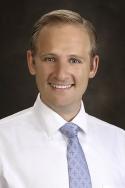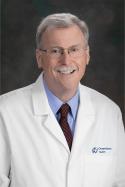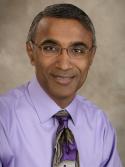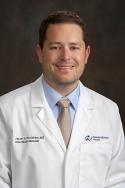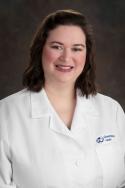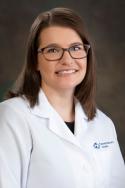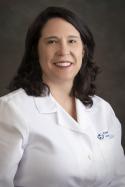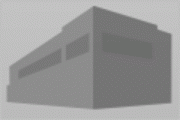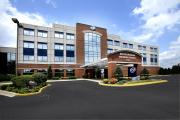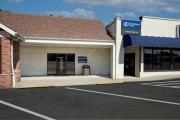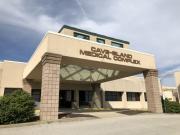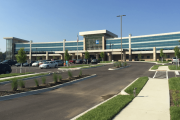Lung Cancer
If you’ve been diagnosed with lung cancer, we’re here to help with nationally renowned expertise and all the compassion you need to navigate a new cancer diagnosis. As a Comprehensive Community Cancer Program accredited by the Commission on Cancer of the American College of Surgeons, we offer many of the same treatment options—and advanced technologies—you’d find at an academic medical center, just close to home.
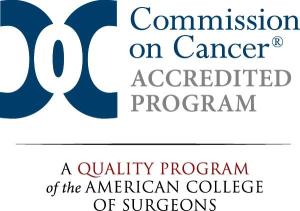
Our multidisciplinary care team works to develop a treatment plan that’s personalized to you—designed around your specific condition, personal preferences and treatment goals. And we’ll treat your lung cancer holistically, caring not just for your physical health, but your mental and emotional health, too.
Lung Cancer Symptoms
Most lung cancers don’t cause symptoms until they’ve spread.
When they do occur, the most common symptoms of lung cancer include:
- A cough that won’t go away or worsens
- Chest pain that worsens with deep breathing, coughing or laughing
- Chronic hoarseness
- Chronic shortness of breath
- Coughing up blood or blood-colored phlegm
- Feeling tired or weak
- Infections like bronchitis and pneumonia that won’t go away or keep coming back
- Unexplained appetite loss
- Unintentional weight loss
Lung Cancer Risk Factors
A risk factor is something that raises your risk for developing a certain type of cancer. Some, like those related to genetics, you can’t change. But others, like risk factors related to lifestyle, you can.
Smoking is the leading risk factor for lung cancer — it’s linked to 80% of lung cancer deaths.
Risk factors for lung cancer include:
- Smoking (including cigarette, cigar and pipe smoking, and exposure to secondhand smoke)
- Personal or family history of lung cancer
- Previous radiation therapy to the lungs
- Air pollution
- Exposure to asbestos
- Exposure to arsenic in drinking water
- Exposure to radon
- Taking certain dietary supplements (such as beta-carotene)
Lung Cancer Types
There are two main types of lung cancer: non-small cell lung cancer (NSCLC) and small-cell lung cancer (SCLC).
The majority of lung cancers—about 80% to 85%—are NSCLC. This type of lung cancer most often affects people who smoke or used to smoke, but it’s also the most common type of lung cancer in people who don’t smoke. It’s also more common in women than in men and is more likely to develop in younger people than other types of lung cancer.
Small-cell lung cancer tends to grow and spread faster than non-small cell cancer and accounts for about 10% to 15% of all lung cancers.
Diagnosing Lung Cancer
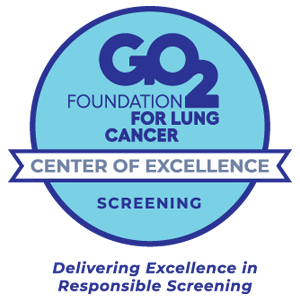
Screening for lung cancer is particularly important since symptoms don’t usually show in its early stages.
If you smoke, used to smoke or fit other high-risk criteria, you may qualify for a low-dose CT (computed tomography) lung cancer screening. Low-dose CT screenings can catch lung cancers when they’re small and easier to treat.
We’re accredited by the American College of Radiology to perform low-dose CT lung cancer screenings at the Healthpark, and at our three Healthplexes (located in Henderson, Madisonville and Powderly).
Owensboro Health Twin Lakes Medical Center and Owensboro Health Muhlenberg Community Hospital can also provide screenings.
Learn More About Lung Cancer Screenings.
Treating Lung Cancer
Our multidisciplinary cancer team will work together to create a treatment plan that’s tailored to you. Your team may include a medical oncologist, surgical oncologist, radiation oncologist and pulmonologist. It may also include a nurse navigator who can guide your care from diagnosis through survivorship.
Your Navigator Can Help You:
- Communicate with your doctor, surgeon and other care team providers
- Find community support and resources
- Learn more about your lung cancer and understand your treatment options
- Make medical appointments
We Treat Lung Cancer in the Following Ways:
- Chemotherapy: This type of therapy can help destroy cancer cells that have spread outside the lungs. If you need chemotherapy, you’ll likely receive it through intravenous (IV) injections over multiple treatment sessions.
- Radiation therapy:
- Brachytherapy involves implanting a small, radioactive pellet into cancerous tissue.
- Intensity-modulated radiation therapy (IMRT) delivers radiation that matches the shape of your tumor.
- Stereotactic body radiotherapy (SBRT) provides high doses of radiation and requires only a few treatments.
- Surgery:
- Minimally invasive lung cancer surgery may help you experience less pain and scarring, as well as a quicker recovery.
- Robot-assisted lobectomy involves a surgeon using mechanical arms to create tiny incisions in your side to remove the cancerous part of your lungs. Owensboro Health has performed robot-assisted lobectomies longer than anyone else in the region and has trained surgeons across the country on the operation.
- Video-assisted thoracic surgery (VATS) involves a surgeon inserting a miniature camera and thin surgical instruments through tiny incisions in the chest to provide images that help guide them in removing cancerous tissue.
On average, people with lung cancer who undergo surgery at Owensboro Health remain in the hospital for three days afterward, almost two fewer days than the national average. Our patients also need intensive care in fewer than 5% of cases — a statistic that’s much lower than the national average.
